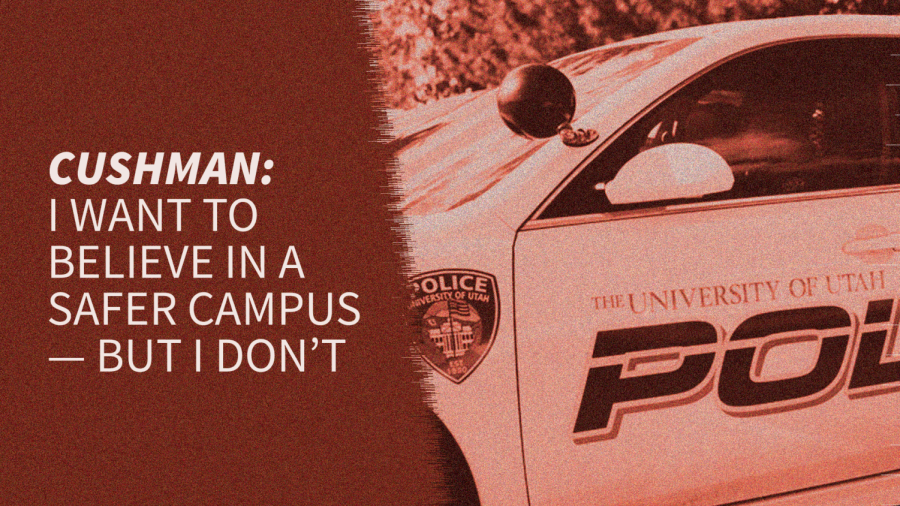Cushman: I Want to Believe in a Safer Campus — But I Don’t
(Graphic by Sydney Stam | The Daily Utah Chronicle)
November 16, 2022
University of Utah interim police chief Jason Hinojosa recently announced changes to how University police will talk to victims. He wants his officers to stop saying three phrases: “There is nothing we can do,” “Why did you wait to report this crime?” and “What do you want me to do?” He sees these phrases as largely irrelevant and more likely to make victims uncomfortable speaking with campus police.
While this shift indicates a change in the right direction, it doesn’t go far enough and won’t rebuild the broken trust between students and the U.
A Campus Students Can’t Trust
Our campus community was heartbroken by the loss of Lauren McCluskey in 2018. Worried about her safety due to stalking behavior from an ex-partner, both McCluskey and her mother reached out to the U. We later found out that beyond campus police failing to provide aid to McCluskey before her death, a U police officer shared explicit pictures of her with a coworker.
An investigation into U police after McCluskey’s death found a force with inadequate training to respond to interpersonal violence. Beyond this, they failed to recognize risk to a student, communicate effectively and provide sufficient resources. Campus police were woefully underprepared to help a student, and it cost us one of our very own, breaking the trust between students and the U.
McCluskey’s death pushed us to look into campus police and other university resources and see their broader failures. The missteps in McCluskey’s case reflected a greater problem with campus police. Further inspection revealed a long record of poor communication with victims and an attitude of hostility and dismissal.
The U has since called McCluskey’s death “transformational” to how it handles “policing, housing, infrastructure and policies, and in how they listen to students.” Following two independent reviews, the U created a plan to facilitate several recommended changes with the goal of improving student safety.
Theoretically, McCluskey’s “transformational” death and the many changes implemented since should have made the U better equipped to protect students. Yet in February of this year, another student died at the hands of an intimate partner after reaching out to campus resources for help multiple times.
Zhifan Dong, a 19-year-old international student at the U, first contacted campus and Salt Lake City authorities in early January. Her roommate continued to contact university authorities in February, with Dong’s roommate attempting to request a wellness check on Dong on Feb 6. Within days, that roommate received news that Dong had been murdered.
The U knew a student was in a dangerous intimate partner situation, much like McCluskey. And once again, our campus left a student vulnerable as they failed to recognize risk and communicate effectively.
The U has continuously let us down and, after promising to do better, let us down again. They’ve broken our trust by swearing to make changes and then failing students fatally. That makes it all the more important that in every action they take moving forward, they give us their best and demonstrate that students can trust them.
Unfortunately, the changes happening now are not the best they can offer.
Enough with the Band-Aid Fixes
In addition to changing U police language, Hinojosa stated that campus police will take an active listening training later this year. He also provided his email for anyone to report if officers use the three unwelcome phrases during victim interviews.
I appreciate the changes Hinojosa is trying to make in his transparency and accessibility to ensure officer accountability. Broader changes are coming as well, with the U’s new public safety building providing on-site victim advocates. These changes demonstrate that the U sees how it has let us down and wants to make a safer campus.
But when we acknowledge the history of institutions like campus housing and police, these changes aren’t enough. Removing a few sentences from police language won’t rebuild trust for a student body that has continually experienced hostility and dismissal from campus police. Having on-site victim advocates at a new building won’t change the interactions between students and the police resources they reach out to for emergencies.
These steps come across as shallow Band-Aid fixes patched onto larger problems. Change can occur slowly, but we haven’t heard concrete efforts to give housing and police the training to ensure accurate risk assessment or appropriate communication with victims.
To rebuild trust with the U, we need to see a comprehensive plan to fix campus safety. Without one, students cannot feel safe.
We need to know that campus authorities have compassion for victims, something the U has also failed to demonstrate in the past.
For many victims, especially sexual assault victims, speaking with police can cause re-traumatization. The way police interact with victims matters and can deeply impact if they feel comfortable speaking and sharing details.
Former Utah police officer Justin Boardman has developed his own trauma-informed victim interview guidelines for police departments to implement. In an email interview, he explained that, with the help of Utah prosecutor Donna Kelly, he made the guidelines based on a deeper understanding of the neurobiology of trauma. He further said that when police speak with victims with compassion and understanding, it changes “the amount of information we can get from a traumatized person,” which helps with “building successful cases.”
I never want to discourage someone who’s trying to make positive change in our campus community. I see Hinojosa’s sincere efforts to make the campus police an organization that students trust. But we need to see a police force dedicated and trained to use trauma-informed language. Not only would that help rebuild some of the trust lost, but it would help police get a better picture of situations they’re called to investigate to improve accurate risk assessment.
Students on campus deserve authorities who can provide aid, assess danger and treat them with compassion. As a student who has experienced sexual assault and is part of the community, I’m asking interim Chief Hinojosa to do more.









